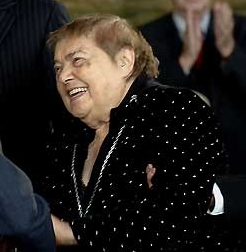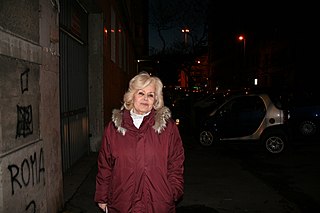
Fabrizio Cristiano De André was an Italian singer-songwriter and the most-prominent cantautore of his time. His 40-year career reflects his interests in concept albums, literature, poetry, political protest, and French music. He is considered a prominent member of the Genoese School. Because of the success of his music in Italy and its impact on the Italian collective memory, many public places such as roads, squares, and schools in Italy are named after De André.

Mina Anna Maria Mazzini or Mina Anna Quaini, known mononymously as Mina, is an Italian singer and actress. She was a staple of television variety shows and a dominant figure in Italian pop music from the 1960s to the mid-1970s, known for her three-octave vocal range, the agility of her soprano voice, and her image as an emancipated woman.

Piero Scaruffi is an Italian-American writer who maintains a website on which his reviews of music, film, and art are published. He has created his own publishing entity called Omnipublishing, that exclusively releases his books about music and science.
The expression Italian popular music refers to the musical output which is not usually considered academic or Classical music but rather has its roots in the popular traditions, and it may be defined in two ways: it can either be defined in terms of the current geographical location of the Italian Republic with the exceptions of the Germanic South Tyrol and the eastern portion of Friuli Venezia Giulia; alternatively, it can be defined as the music produced by all those people who consider themselves as Italians and openly or implicitly refer to this belief. Both these two definitions are very loose: due to the complex political history of the Italian Peninsula and the different independent political states, cultural and linguistic traditions which sprang within them, it is rather difficult to define what may be considered to be truly Italian. Since before the formation of a unified educational system and the spread of information through the radio and the press during the 1920s, all the different cultural and linguistic groups within the country were independent of one another, and a unified Italian country was still only a political or ideological concept far from the daily life.

Fernanda Pivano was an Italian writer, journalist, translator and critic.

Ivano Alberto Fossati is an Italian pop singer from Genoa. He was a member of the progressive rock group Delirium and has worked with Fabrizio De André, Riccardo Tesi, Anna Oxa, Mia Martini, Ornella Vanoni, Shirley Bassey, Francesco De Gregori, Menudo and Mina.

Eugenio Finardi is an Italian rock singer, songwriter, guitarist and keyboardist.

Stormy Six were an Italian progressive and folk rock band founded in Milan in 1966. They performed and recorded until 1983, mostly as a sextet but occasionally as a quartet, a quintet and a septet. Although their line-up changed considerably over the years, founding member Franco Fabbri remained with the group for its entire duration. In May 1993 they performed at a re-union concert in Milan, which was recorded and released on a CD, Un Concerto (1995).

Vincenzo Jannacci, more commonly known as Enzo Jannacci, was an Italian singer-songwriter, pianist, actor and comedian. He is regarded as one of the most important artists in the post-war Italian music scene.
Piero Milesi was an Italian musician, composer, and music arranger.
Massimo Milano is an ethnomusicologist, critic and sound experimentalist.
Paolo Fabbri, born 15 October 1948, is an Italian musicologist and academic. In 1989 he was awarded the Dent Medal. He is best known for his extensive publications on the life and works of Gioachino Rossini, and for a biography of composer Claudio Monteverdi which was first published in the Italian language in Turin in 1985 and later published by Cambridge University Press using an English language translation by Tim Carter in 1994. He is also the author of Il secolo cantante: Per una storia del libretto d'opera nel Seicento. For many years he has been a Professor of Music History and Musical Aesthetics at the University of Ferrara. He is the current director of the Fondazione Donizetti library in Bergamo.
Thema (Omaggio a Joyce) is an electroacoustic composition by Luciano Berio, for voice and tape. Composed between 1958 and 1959, it is based on the interpretative reading of the poem "Sirens" from chapter 11 of the novel Ulysses by James Joyce by Cathy Berberian and on the elaboration of her recorded voice by technological means.

Franco Mussida is an Italian guitar player, composer, and singer.

Pino Rucher was an Italian guitarist active in orchestral settings and in film soundtracks.
Massimiliano Pani is an Italian songwriter, producer and composer born on 18 April 1963 in Milan to parents Corrado Pani and Mina. His mother has always aroused great curiosity and interest not only for her career but the events that have characterized her private life Corrado Pani was married at the time and due to Mina's refusal to hide the relationship, the singer was banned from performing on public Italian television or radio channels. Within a year, her affair with Corrado ended.

Anna Cantalupo, stage name Aura D'Angelo, is an Italian popular singer of the 1960s. In 1972 she received the Vulture d'oro prize at Melfi.
Vincenzo Caporaletti is an Italian musicologist known for devising audiotactile formativity theory.
Patricia Adkins Chiti was a mezzo-soprano and musicologist involved in projects by and for women. She created the Fondazione Adkins Chiti: Donne in Musica in the nineteen-nineties, after starting Donne in Musica in 1978, and was a promoter of research projects regarding women in music, for which she was recognised worldwide. She received numerous prizes and awards, including the Premio de Investigación Musical "Rosario Marciano".

Fabrizio De André in Concerto - Arrangiamenti PFM ["In Concert—Arrangements by PFM"] is a 1979 live album by Fabrizio De André featuring Italian progressive rock band Premiata Forneria Marconi, also known as PFM, as his backing band, recorded during their successful 1979 tour of Italy and Europe. Built on powerful, complex and carefully crafted rock arrangements, either by single band members or by the band as a unit, the album marked a significant stylistic and musical departure for De André, whose output up to that point had always employed acoustic-based, folk arrangements, occasionally branching into pop but never overtly using rock structures and instrumentation. Upon release, the album became immediately very popular and paved the way for other Italian singer-songwriters for their own transition from a folk style into a more rock-oriented one. The album was followed by a Volume 2 the next year, recorded during the same shows.











